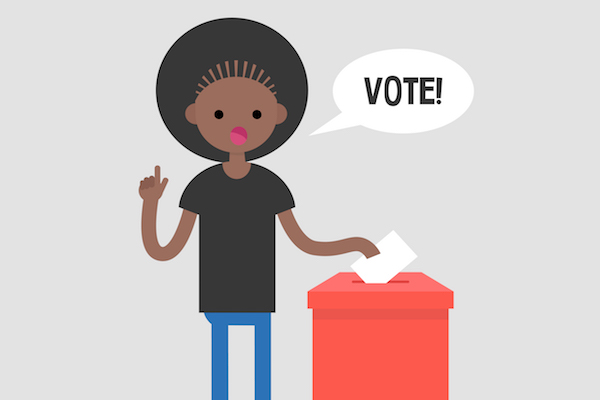As the U.S. continues to face COVID-19, voting in the 2020 general election will be very different from previous elections. To keep ourselves and others safe, many of us will vote by mail. However, recent changes to the U.S. Postal Service enacted by Postmaster General Louis DeJoy have triggered widespread concern that voters won’t receive their absentee ballots on time or be able to return their ballots before state deadlines.
 Register to Vote or Check Your Registration Info
Register to Vote or Check Your Registration Info
If you’re eligible to vote, register as soon as possible, and don’t forget to re-register if you’ve moved to another state or territory.
If you’ve voted before, check your registration status for your name and the correct address. Some states purge their voter registration lists by deleting the names of inactive voters. Even if you have voted in a recent election, check to make sure that your name wasn’t deleted and that your information is correct.
 Request Your Mail-In Ballot
Request Your Mail-In Ballot
Once you’ve registered and checked your registration status, see if your state will automatically mail you a ballot this election. If your state requires you to request your ballot, do so ASAP to give it as much time as possible to be mailed to you. Keep in mind that while many states allow you to request your ballot online, some states will require you to mail in your application or deliver it to your local election office. You may also be required to include copies of identifying documents (like passports and driver’s licenses) and proof of address with your application.
 Fill Out and Return Your Ballot
Fill Out and Return Your Ballot
When you receive your absentee ballot, follow all instructions for filling it in and sealing it in the envelope provided to you. (Ballots that are filled out incorrectly may be discarded.) There are multiple ways to return your ballot:
By Mail
Plan to send your ballot at least two weeks before your state’s deadline for receiving postmarked ballots. Also check the return envelope to see how many stamps you need, if any.
By Drop Box
Ballot drop boxes are a secure alternative to returning your ballot by mail. Your state election website will have a list of drop box locations and which one you should use. Be sure that the list of drop boxes is for the 2020 general election—locations may not be the same as they were during the primaries.
In Person
You may also hand deliver your ballot to your local board of elections or take it to a polling place on the day(s) of voting. If you want someone to deliver your ballot to a drop box or an in-person location for you, check your state’s rules for who can do so.
 Know How to Vote in Person
Know How to Vote in Person
If you decide not to vote by mail or you do not receive your ballot in time to fill it out, you will need to vote in person. Avoid stress by looking up your polling place before Election Day, which is November 3. Your assigned polling place is based on your address.
Some states offer early voting to give people extra days before the election to vote. Check your state’s voter website to see if this is an option.
No matter when you go to the polls, wear a mask, sanitize your hands before and after touching voting machines, and follow social distancing rules. Don’t take pictures of yourself in the voting booth—this is illegal and it keeps other voters waiting for their turn longer. (But feel free to snap a selfie once you’ve left the polls!)
 Know Your Rights
Know Your Rights
Don’t get turned away from the polls. In many scenarios, you have the right to request what’s called a provisional ballot. For example, you can request one if records at your polling place show that you’re not a registered voter or that you received a mail-in ballot.
Know what time polling places in your state close. If you’re in line to vote at your polling place before it closes, you must be allowed to vote.
If you see or experience problems with voting, call the Election Protection Hotline at 866-OUR-VOTE (866-687-8683). Visit 866OurVote.org for more info.
 Spread the Word and Get Involved!
Spread the Word and Get Involved!
Now that you’ve done these steps, ask your friends and family to do the same. Call your parents and siblings. Message your group chat. Post information and calls to action on social media. Keep doing this until the election is over!
If you’re young and healthy, you can also volunteer as a poll worker to support polling places. Because many people who regularly volunteer at the polls are older adults, who are encouraged to practice social distancing, many poll locations need younger adults to fill these shoes. Many poll workers are paid. Check your local election board’s website for more information.


